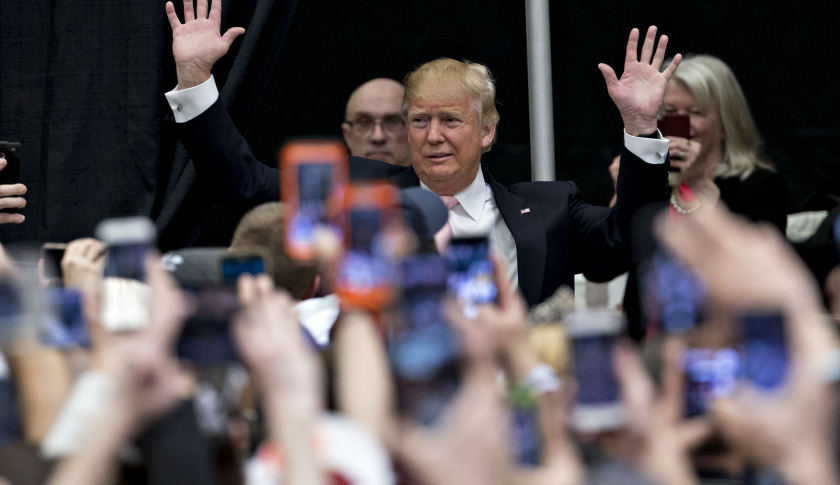WEEKEND READ: Trump clicks all the right news boxes
CRISPIN HULL

DON’T do it, I tell family and friends. Don’t do it, I told my students for a decade or so. On media sites, do not click on bizarre or celebrity articles. “Gorillas bring up baby.” “Angelina’s new heartache.” And so on.
All it does is encourage editors to run more of this junk at the expense of concentrating on importance material of consequence as they see these stories top “most hit” lists.
But now Donald Trump is proving this advice misguided because though news of his actions is that of a celebrity and bizarre, it is also, alas, material of great consequence.
The coverage of the Trump candidacy exemplifies the great transition in the media, as the use of the internet inexorably increases.
And many of changes are quite encouraging.
Importantly, it was mainstream, serious media – in the form of The Washington Post – that broke the story about Trump’s bragging about his propensity to engage in what can only be termed as sexual assaults.
But it was a new iteration of mainstream media because the Washington Post journalist who broke the story, David Fahrenthold, tweeted the headline (“Trump recorded having extremely lewd conversation about women”) and the thing went viral immediately.
The Washington Post site carried the video.
It was a classic example of the new media environment. A respected traditional newspaper website carries video, sent to it, presumably, by some outside source. It is posted as soon as it is verified. And the posting is immediately tweeted so is picked up almost immediately by other media outlets.
Pictures, video and words come together. There is no need to wait for the overnight printed version. The internet is used to advertise the story. The video was sent so easily to the newspaper.
But when all said and done, it was the Washington Post’s stamp that gave credence to the video’s authenticity.
If the video had been posted to someone’s blog it would not have had the same effect.
The New York Times has also broken significant stories about Trump.
Mainstream media remains society’s main source for credible authentic news and comment – comment and analysis that can inform and change readers’ minds, rather than mindlessly preaching to the converted with froth and babble .
Some mainstream outlets have fared better than others. But in any event consumers have benefited. Subscription costs for publications behind pay walls are often less than a quarter of paper costs for a product that gives searchable access to archives and is far better organised than the paper version.
Some remain free and thrived. The Guardian, for example, once a small British outfit with readers numbered in tens of thousands is now a worldwide publication with readers in the millions.
In the new media environment, the newspaper sites have often joined with broadcasters in major investigative journalism. Fairfax’s co-operation with the ABC is a good example.
So, despite the internet’s significant impact on traditional print media’s advertising and circulation revenues, it is clear than these mainstream journalism publications have survived and thrived, commanding more readers and as much respect as before.
In many ways they have quietly benefited from the internet by becoming much more efficient. The newspaper library is a thing of the past, at least for words. Journalists do their own searching and the database is automatically updated electronically – a huge staff saving. Image archiving, however, still requires effort.
Gathering news is also much more efficient. Email, voice mail, Skype and mobile phones sure beat landlines without answering machines.
Word-processing and uploading to the net sure beat typewriters, linotype machines and printing presses.
Editing is also more efficient. Spell and grammar checkers (properly used) help. Also, there is no need to worry about editing for style consistencies, such as US, British or Australian spelling, given any Google search will have a mismatch anyway.
Twitter and Facebook also alert journalists to possible breaking stories for confirmation and follow-up.
Expert sources are more easily found online. Citizen journalism – whereby people can easily send tips and images to news sites – make the task easier.
With those efficiencies, you do not need the old “rivers of gold” classified advertisements to make a good news site.
But you do still need good journalism – digging, checking, following up, connecting the dots.
That said, it is true that a number of credible expert sites have sprung up and prospered, notably The Conversation which gives academics in a swathe of disciplines a place to air their facts and opinions directly to the public without being filtered through journalists.
Now back to the Trump phenomenon. Many people, no doubt wish he would just go away. The trouble is that virtually everything he does hits the seven or eight key “news values” that go beyond the mere provision of information.
For a couple of centuries journalists and publishers have worked out what interests people and will run stories according to these news values or newsworthiness.
Will it impact on people’s lives (the US presidency sure does)? Is it timely (you can’t be more timely than tweeting)? Is it about something or someone prominent (short of being president, a presidential candidate is most prominent)? Is it bizarre or novel (virtually everything Trump does is bizarre or novel)? Does it involve conflict (everything he does is conflict)? Is there currency about what he does (yes)? And human interest (in a bizarre sort of way)?
Stories about Trump tick all the news boxes. That why he gets such a run. More coverage perhaps than any other presidential candidate.
Perhaps we can add another “news value” because of, among other things, the Trump phenomenon. Does the story generate social media noise? If so, it will now be newsworthy, for mainstream journalism.
And ultimately, mainstream media caught Trump out with the one story that caused his own party to dessert him and to finish him.
www.crispinhull.com.au
